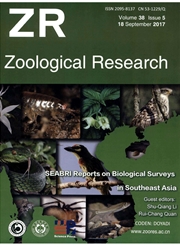

 中文摘要:
中文摘要:
A new species of the genus Amolops Cope,1865 is described from Nyingchi,southeastern Tibet,China,based on morphological and molecular data.The new species,Amolops nyingchiensis sp.nov.is assigned to the Amolops monticola group based on its skin smooth,dorsolateral fold distinct,lateral side of head black,upper lip stripe white extending to the shoulder.Amolops nyingchiensis sp.nov.is distinguished from all other species of Amolops by the following combination of characters:(1)medium body size,SVL 48.5-58.3 mm in males,and 57.6-70.7 mm in females;(2)tympanum distinct,slightly larger than one third of the eye diameter;(3)a small tooth-like projection on anteromedial edge of mandible;(4)the absence of white spine on dorsal surface of body;(5)the presence of circummarginal groove on all fingers;(6)the presence of vomerine teeth;(7)background coloration of dorsal surface brown,lateral body gray with yellow;(8)the presence of transverse bands on the dorsal limbs;(9)the presence of nuptial pad on the first finger in males;(10)the absence of vocal sac in males.Taxonomic status of the populations that were previously identified to A.monticola from Tibet is also discussed.
 英文摘要:
英文摘要:
A new species of the genus Amolops Cope, 1865 is described from Nyingchi, southeastern Tibet, China, based on morphological and molecular data. The new species, Amolops nyingchiensis sp. nov. is assigned to the Amolops monticola group based on its skin smooth, dorsolateral fold distinct, lateral side of head black, upper lip stripe white extending to the shoulder. Amolops nyingchiensis sp. nov. is distinguished from all other species of Amolops by the following combination of characters: (1) medium body size, SVL 48.5-58.3 mm in males, and 57.6-70.7 mm in females; (2) tympanum distinct, slightly larger than one third of the eye diameter; (3) a small tooth-like projection on anteromedial edge of mandible; (4) the absence of white spine on dorsal surface of body; (5) the presence of circummarginal groove on all fingers; (6) the presence of vomerine teeth; (7) background coloration of dorsal surface brown, lateral body gray with yellow; (8) the presence of transverse bands on the dorsal limbs; (9) the presence of nuptial pad on the first finger in males; (10) the absence of vocal sac in males. Taxonomic status of the populations that were previously identified to A. monticola from Tibet is also discussed.
 同期刊论文项目
同期刊论文项目
 同项目期刊论文
同项目期刊论文
 期刊信息
期刊信息
